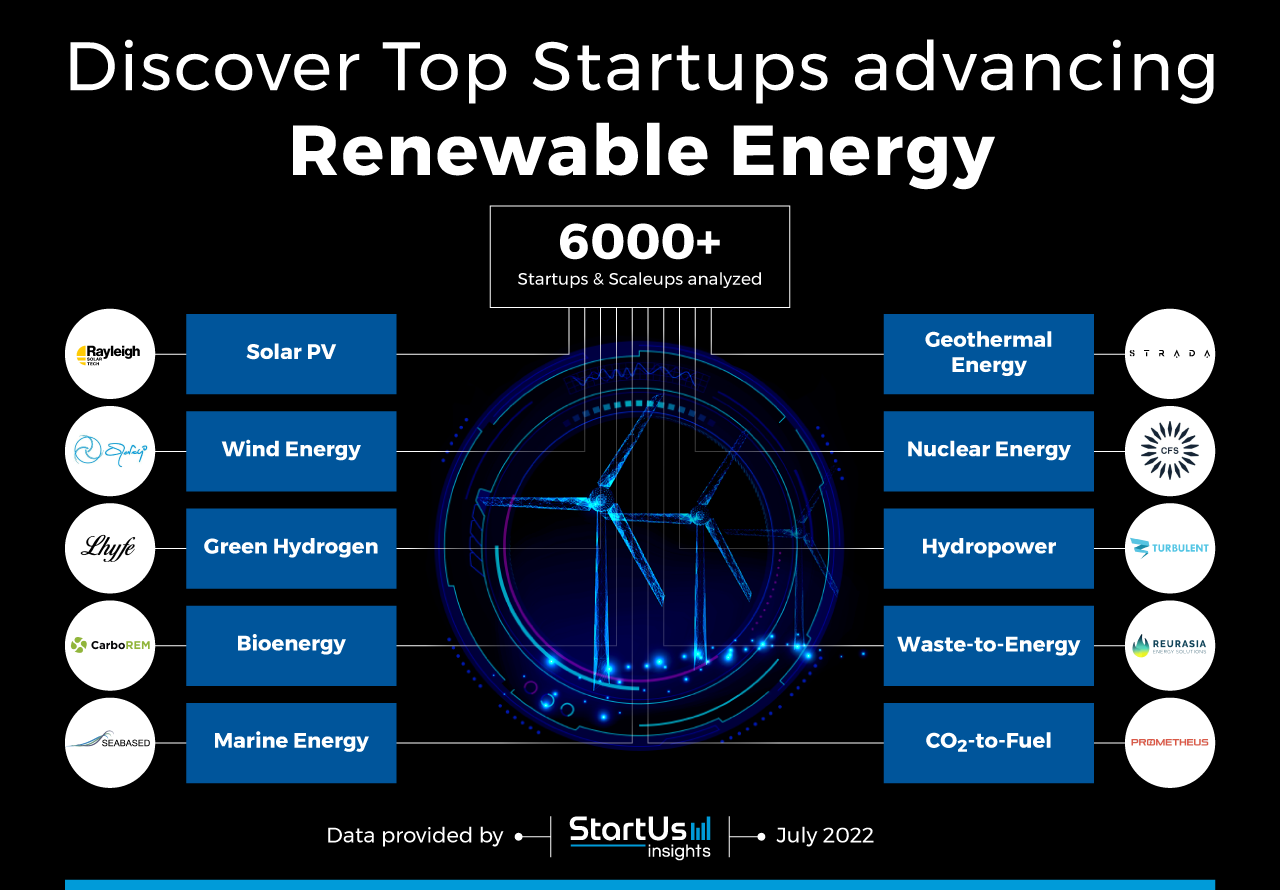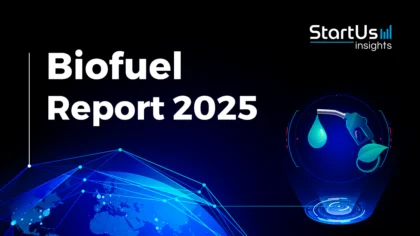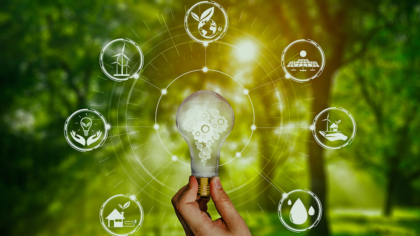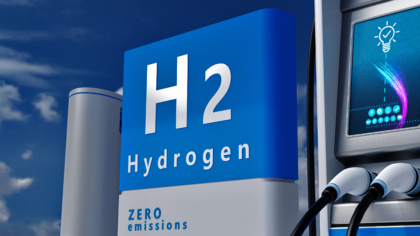Staying ahead of the technology curve means strengthening your competitive advantage. That is why we give you data-driven innovation insights based on our analysis of 6 000+ renewable energy startups & technologies. This time, you get to discover 10 hand-picked renewable energy startups accelerating our transition to sustainable energy.
Innovation Map highlights 10 Global Renewable Energy Startups
For this in-depth research on the Top Renewable Energy Startups, we analyzed a sample of 6 000+ global startups and scaleups. These insights are derived by working with our Big Data & Artificial Intelligence (AI)-powered StartUs Insights Discovery Platform, covering 2 093 000+ startups & scaleups globally. The platform quickly delivers an exhaustive overview of emerging technologies within a specific field as well as identifies relevant startups & scaleups early on.
In the Innovation Map below, you get an overview of the 10 emerging renewable energy domains that utilize technology to transition away from fossil fuels. This research provides you with data-driven innovation intelligence that improves strategic decision-making by giving you an overview of emerging technologies & startups advancing renewable energy.
Explore 10 Innovative Renewable Energy Startups
1. Solar Photovoltaic (PV)
Advances in photovoltaic (PV) cells are enabling solar power companies to ensure high power conversion efficiency. Similarly, lower costs of solar cells are generating interest among consumers as they transition to cleaner and renewable energy sources. That is why solar energy greatly impacts the shift to a low-carbon energy economy. Startups further this by offering solutions such as decentralized solar generation units and grid-scale power projects. This allows utilities and businesses to reduce their carbon footprint, address growing energy demands, and ensure high market penetration. Some solar energy solutions include:
- Advanced Photovoltaics
- Floating PV
- Thin-film Solar Cells
- Concentrated Solar Power (CSP)
- Community Solar
- Large-scale PV Projects
- Organic Solar Cells
- Solar-based Water
Rayleigh Solar Tech offers Printed Perovskite Solar Cells
Canadian startup Rayleigh Solar Tech produces roll-to-roll printed flexible perovskite solar cells. The startup combines inorganic and organic compounds with low-cost manufacturing techniques to develop these cells. Rayleigh Solar Tech’s solar cells are ultra-thin, lightweight, and manufactured at lower temperatures than traditional solar panels. Additionally, the flexibility of these solar cells enables their use on curved surfaces of electric or hybrid vehicles, reducing grid dependency.
Explore all 1 000+ solar energy solutions!
2. Wind Energy
Wind power is a great candidate that complements solar energy in transitioning to a cleaner grid. However, capital-intensive infrastructure requirements and design constraints severely affect the adoption of wind energy systems. To tackle this, startups develop modular and prefabricated windmills. Other wind energy startups improve windmill design to optimize on-site assembly operations, increase energy production and extend end-of-life periods. As a result, energy companies can reduce the operational costs associated with wind turbine installations and ensure a clean energy supply. Some wind energy solutions include:
- Wind Turbine Design Solutions
- Airborne Wind Energy Systems
- Self-erecting Towers
- Compact Wind Turbines
- Low-Speed Wind Turbines
Devecitech builds Vertical Wind Turbines
Dutch startup Devecitech develops Enlil, a smart vertical wind turbine that harvests energy from natural wind and passing vehicles. The startup places these turbines on highways and other transportation lines. Enlil uses the wind created by passing vehicles and natural wind to run its turbine. This transforms highways into renewable energy sources.
Discover all 1 000+ wind energy solutions.
3. Green Hydrogen
Green hydrogen production leverage renewable energy systems and has a much lower carbon footprint than steam reforming-based hydrogen. Startups working in the sector reduce the high production costs of clean hydrogen. Additionally, many startups develop low-cost and innovative hydrogen storage and transportation solutions. This increases the adoption rate of hydrogen as an energy carrier. As a result, energy companies augment natural gas supplies with green hydrogen and reduce their carbon intensity. Moreover, green hydrogen functions as a transition fuel to transition into clean and renewable energy infrastructure. Few solutions advancing green hydrogen adoption include:
- Hydrogen Infrastructure
- Hydrogen Generation
- Power-to-Hydrogen
- Hydrogen Carriers
- Hydrogen-powered Vehicles
Lhyfe operates Offshore Hydrogen Production Facilities
Lhyfe is a French startup that produces hydrogen from renewable sources in on-shore and off-shore facilities. The startup reinjects the oxygen created from its hydrogen production process into the surrounding aquatic ecosystem. Additionally, Lhyfe deploys a building-block solution that directly connects to natural renewable energy sources like wind power, PV energy, and hydraulic power, among others. The startup’s offshore hydrogen production thus provides clean hydrogen as a fuel for transportation and simultaneously addresses concerns over declining oxygen levels in oceans due to marine pollution.
Discover the Top 10 Hydrogen Trends for 2022!
4. Bioenergy
Bioenergy generation systems are deployed near waste generation sites and leverage burning or fermentation to generate heat, ethanol, biofuels, and biogas. Besides, bioenergy production uses renewable feedstocks and does not contribute additional CO2 to the atmosphere. Biomass also produces heat and electricity in combined heat power (CHP) plants. This allows energy companies to reduce their carbon footprint as well as offer heat and power to energy consumers cost-effectively. Some bioenergy solutions include:
- Biofuel
- Biorefinery for Clean Energy
- Clean Cooking Fuel
- Bio-Oils
- Sustainable Briquettes
CarboREM utilizes Wastewater for Biogas Production
Italian startup CarboREM produces biogas in wastewater treatment plants. The startup’s hydrothermal conversion (HTC) technology, HTC C700, reduces the volume of sludge, reducing costs related to transport and disposal while increasing the economics of sewage sludge plants. Moreover, it transforms waste into a liquid that improves the biogas generation process within anaerobic digesters. Additionally, HTC C700’s modularity allows it to be easily integrated into existing wastewater treatment facilities, reducing capital expenses.
Learn about the 5 top bioenergy solutions out of 650+.
5. Marine Energy
Tapping into ocean energy enables an additional revenue source for renewable energy companies and facilitates energy transition. To aid this, startups provide high-efficiency energy converters and offshore and onshore energy generation platforms. This allows marine energy companies to scale operations based on ocean conditions and energy demands. At the same time, coastal communities leverage marine energy sources to decouple their energy requirements from the grid. This allows energy companies to expand to remote markets without massive capital expenditure. Some marine energy solutions include:
- Tidal Energy
- Wave Energy
- Wave Energy Turbines
Seabased offers Wave-to-Grid Systems
Seabased is an Irish startup that provides cost-competitive renewable wave energy to the grid. The startup’s patented technology harnesses wave energy converters (WECs) – buoys on the surface connected with linear generators resting on the seabed. The waves move the buoys, which drive the cable and the magnets in the generator on the seafloor to generate electrical power. The underwater switchgear, or marine substation, converts the power produced by multiple WECs into electricity suitable for grid use. Additionally, the startup’s wave energy parks discharge zero pollutants and eliminate blades that may injure or kill marine life.
6. Geothermal Energy
Fossil fuel consumption in cold regions is high due to the continuous need for heating. Leveraging geothermal energy for heating systems thus greatly reduces their energy consumption. However, geothermal energy companies generally find it challenging to store the heat before delivering it to consumers. As a result, startups are developing thermal energy storage solutions and advanced equipment to reduce seismic risks due to geothermal drilling. Additionally, other startups develop grid-scale geothermal energy projects. This allows utility companies to reduce dependence on fossil fuels and transition to cleaner energy sources. Some geothermal energy solutions for utilities and industries include:
- Localized Geothermal Power
- Refined Thermodynamic Rankine Cycle (TRC) Technology
- Heat Exchanger Fluid Solutions
- Geothermal Power Projects
Strada Global specializes in Water Hammer Drilling Technology
UK-based startup Strada Global offers innovative geothermal drilling solutions to energy companies. The startup’s patented drilling technology, Water Hammer, uses a dual circulation technique to improve drilling speed and performance. Conventional mud rotary drilling takes a long time whereas Water Hammer results in reduced maintenance costs and is more effective. Additionally, this reduces capital expenses and ensures timely project completion.
Explore our analysis of the 5 top geothermal energy startups out of 91.
7. Nuclear Energy
Nuclear power plants have a small land footprint and high power output. This makes nuclear fission a great candidate to replace fossil fuels. However, the risk of nuclear meltdowns is hindering its adoption. That is why researchers and startups are developing nuclear fusion reactors. They greatly minimize the dangers associated with nuclear energy production. At the same time, other startups work to improve the safety and efficiency of fission-based power generation. Together, nuclear fission and fusion facilitate the transition to a low-carbon economy. Some nuclear energy solutions include:
- Low-Pressure Fluoride Coolant High-Temperature Reactor
- Compact Molten Salt Reactor (CMSR)
- Molten Chloride Salt Fast Reactor (MCSFR)
- Nuclear Fuel Cycle Management
- Nuclear & Radioactive Waste Disposal Technology
Commonwealth Fusion Systems builds Nuclear Fusion Energy Systems
US-based startup Commonwealth Fusion Systems builds SPARC, a nuclear fusion device that produces plasmas that generate more energy than they consume. SPARC enables the generation of carbon-free, safe, and limitless fusion power with the help of the Alcator C-Mod, a compact high-field tokamak, as well as high-temperature superconductor (HTS) magnets. The startup is constructing its own commercial nuclear fusion plant, ARC, and plans to start commercial energy production by 2025.
Read our data-driven analysis of 5 out of 350+ startups developing nuclear energy solutions.
8. Hydropower
Hydroelectricity already powers a significant part of the electric grid. Innovations in this energy sector improve generation equipment efficiency and reduce environmental impacts. To achieve this, startups leverage small-scale hydropower plants, thermal energy conversion, and coastal hydropower plants. This enables utilities to source power more cost-effectively while reducing seasonality in power generation and ensuring operational sustainability. Few hydropower solutions facilitating the energy transition include:
- Wave-Capture Power Generation
- Coastal Hydropower Plants
- Small-Scale Hydropower
- Ocean Thermal Energy Conversion (OTEC)
Turbulent provides Affordable Whirlpool Turbines
Belgian startup Turbulent creates resilient and cost-efficient turbines for employing in rivers and requiring a low height fall. The startup provides environmentally-friendly hydropower for remote communities. Turbulent’s whirlpool system is fish-friendly as it diverts the incoming flow into a low-pressure vortex, allowing aquatic life to pass through unharmed. Other benefits of their turbines include ease of installment and maintenance, a longer operating life, and remote control and monitoring.
Get to know the 5 top hydropower startups out of 100+.
9. Waste-to-Energy (WTE)
Waste-to-energy systems feed on organic and inorganic waste to create electricity. This allows communities and governments to tackle growing waste generation rates and address increasing energy requirements. Startups leverage advances in chemical recycling processes to convert or upcycle material wastes into high-value fuels. Besides, startups develop biomass waste streams from agriculture and food wastes to generate bioenergy. Since WTE reactors need a much lesser footprint, capital, and resources than conventional energy sources, they have a high interest in decentralized energy ecosystems. Few solutions advancing WTE include:
- Food Waste-to-Energy
- Plastic-to-Fuel
- Waste Gasification
- Pyrolysis
Reurasia advances Anaerobic Digestion
Reurasia is a Filipino startup that offers waste-to-energy solutions to tackle wastewater, sludge, and solid waste. The startup’s process uses a high concentration of anaerobic bacteria to treat wastewater from paper mills, food processing factories, breweries, and pharmaceutical companies. The concentrated anaerobic solution also converts solid wastes such as manure, silage, biomass, agriculture residues, and food wastes. By converting waste into renewable energy, the startup advances the circular economy.
Find more about 4 out of 100+ waste-to-energy startups.
10. CO2-to-Fuel
Similar to WTE systems, leveraging the excess amount of carbon dioxide in the atmosphere to power daily energy needs slows climate change. For this, the technology needs wide adoption across industries. CO2-to-fuel technologies are primarily profitable for carbon-intensive operations like industrial processes. Capturing CO2 at the source and reusing it for power generation thus significantly reduces industrial energy costs. Therefore, researchers and startups are developing cost-effective carbon capture and storage solutions to accelerate CO2-to-fuel adoption. Among other solutions, CO2-to-fuel startups offer these solutions:
- Thermochemical CO2 Processing
- Electrochemical Reactor for CO2 Conversion
- Electrochemical Energy Storage Devices
Prometheus makes Net-Zero Gasoline & Jet Fuel
Prometheus is a US-based startup that captures CO2 from the air to produce net-zero gasoline and jet fuel. The startup’s fuel generation unit, Titan Fuel Forge, comprises 4 stages: carbon salvage, charging, molecular sorting, and custom assembly. Initially, fans draw air into the carbon salvage tower, where CO2 and water are isolated. In the charging stage, the startup utilizes a Faraday Reactor for CO2 electrolysis and produces long-chain alcohols, in turn, liberating oxygen. Further, the molecular sorting stage uses a Maxwell core membrane and carbon nanotubes to isolate alcohols from water. The isolated alcohols are forwarded to custom assembly to produce desired fuel.
Take a deep dive into 5 top energy startups converting CO2 into fuel out of 349.
Discover All Renewable Energy Startups
New startups and technologies emerge that improve and transform renewable energy systems every day. These solutions span a range of applications from solar and wind power generation to nuclear fission and fusion. Renewable energy trends show a shift to making power generation more efficient and affordable. This will increase the market penetration of renewables and ultimately replace fossil-based power sources. To aid this, startups are leveraging novel technologies to optimize and improve energy generation systems and processes. Get in touch to identify specific renewable energy startups & solutions that enable the transition towards a clean energy future for your business!









